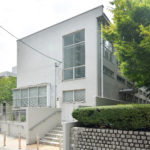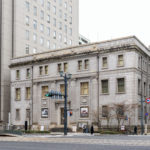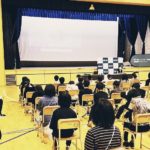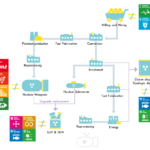Q11 Does Hiroshima support post-conflict regions?
 Originally, Hiroshima’s peace efforts were focused on nuclear disarmament. However, the Hiroshima Prefectural Government has started announcing plans to support reconstruction in post-conflict regions.
Originally, Hiroshima’s peace efforts were focused on nuclear disarmament. However, the Hiroshima Prefectural Government has started announcing plans to support reconstruction in post-conflict regions.
Plan to support reconstruction efforts
Following the 50th anniversary of the atomic bombing, in 1996, the “Hiroshima International Contribution Plan” was formulated by Hiroshima Prefecture, the City of Hiroshima and other related organizations to contribute to world peace and prosperity under the principle of “peacebuilding” by reforming already existing initiatives. In 2002, Hiroshima Prefecture and the Nippon Institute for Research Advancement studied the theoretical significance of reconstruction support offered by local governments in their report Kioku kara Fukko e: Funso Chiiki ni okeru Fukko Shien to Jichitai no Yakuwari (From Remembrance to Reconstruction: Post-conflict Reconstruction and Revitalization as Agendas for Local Governments). In 2003, the Hiroshima Peace Contribution Plan Report: From praying for peace to peacebuilding was compiled.
Further, in 2011, the “Hiroshima for Global Peace” Plan was compiled as a new plan encompassing both the abolition of nuclear weapons and reconstruction/peacebuilding. Based on the plan, efforts to support reconstruction and peacebuilding in post-conflict regions have been implemented.
Actions based on the plans
Based on the plans above, Hiroshima Prefecture has worked together with the Japan International Cooperation Agency (JICA) to support Cambodia’s reconstruction under the framework of the “JICA Partnership Program” since 2005. This project provides support for human resource development mainly in the educational sector including elementary schools and elementary school teachers’ training institutes in agricultural areas, in cooperation with universities in Hiroshima Prefecture as well as education professionals. Since 2014, Hiroshima Prefecture has also supported the training of young candidates to serve in local administrations in Mindanao, the Philippines, in collaboration with the universities in the prefecture. Mindanao Island had suffered from a conflict that lasted over 40 years.
Efforts are also being made in Cambodia towards activities to improve health and sanitation conditions in collaboration with NGOs, the faculties of medicine and dentistry of Hiroshima University, other universities in Hiroshima Prefecture and medical professionals, as well as the construction and furnishing of the “Cambodia-Hiroshima House” in Phnom Penh through the Hiroshima-Cambodia citizens’ exchange group.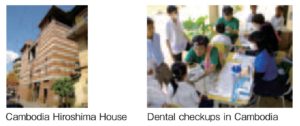 In addition, Hiroshima Prefecture has some institutions, including the Japan International Cooperation Agency’s (JICA) Chugoku Center and the United Nations Institute for Training and Research’s (UNITAR) Hiroshima Office. These institutions accept trainees from post-conflict countries/regions to support the human resource development needed to rebuild their nations.
In addition, Hiroshima Prefecture has some institutions, including the Japan International Cooperation Agency’s (JICA) Chugoku Center and the United Nations Institute for Training and Research’s (UNITAR) Hiroshima Office. These institutions accept trainees from post-conflict countries/regions to support the human resource development needed to rebuild their nations.
Inquiries about this page
Hiroshima Prefectural Office
Street address:10-52, Motomachi, Naka-ku, Hiroshima-shi, Hiroshima-ken, 730-8511
Tel:+81-(0)82-228-2111



